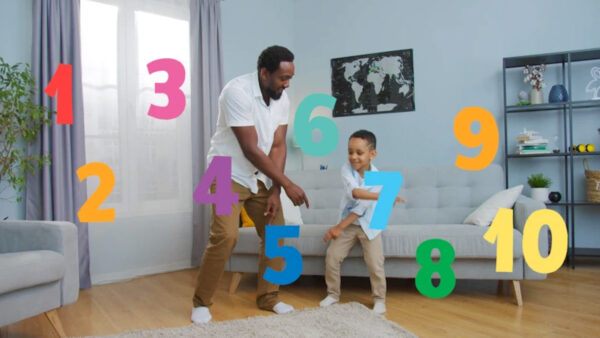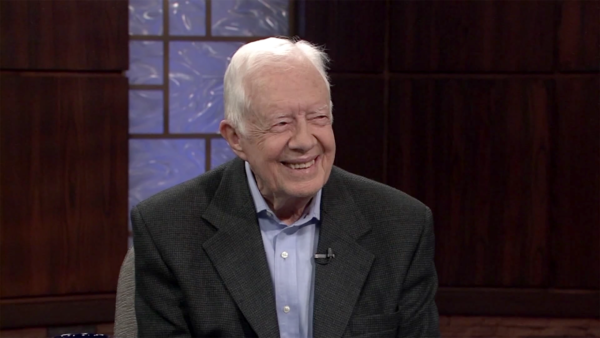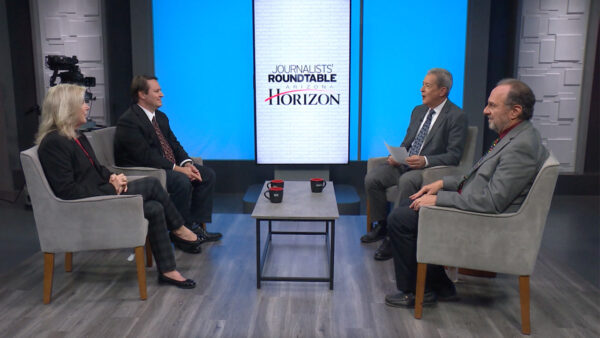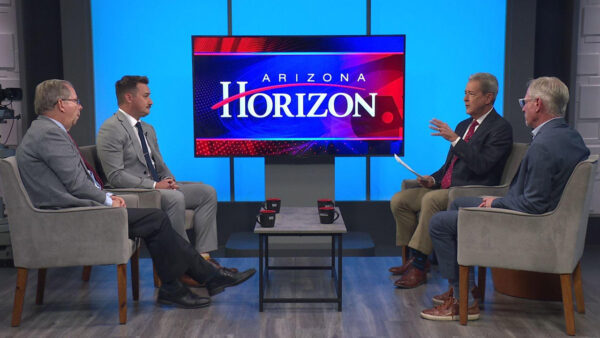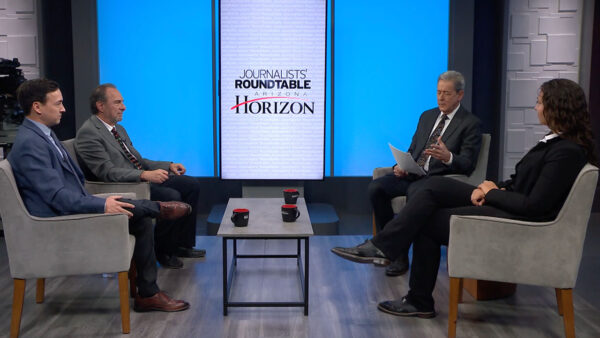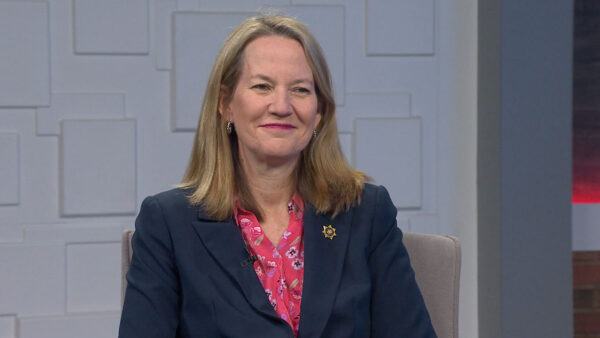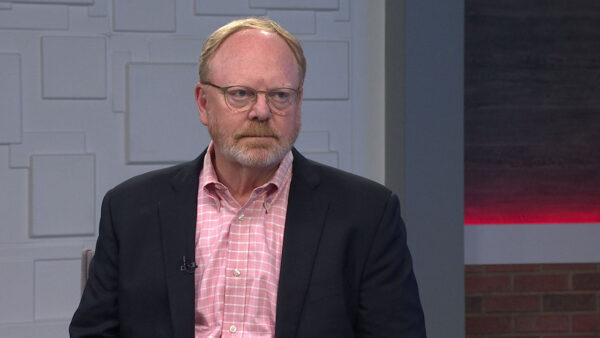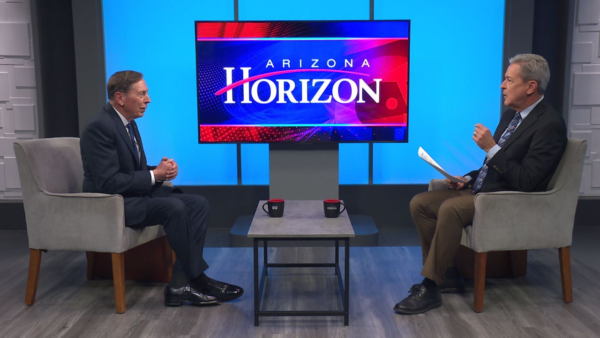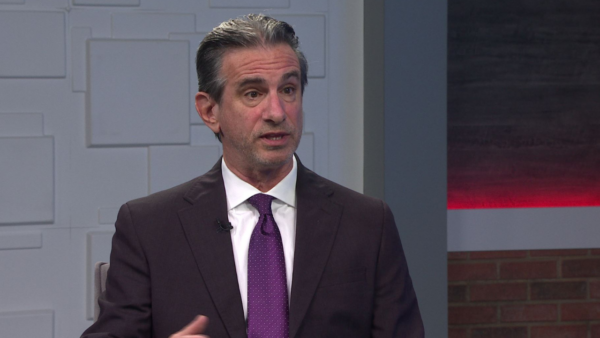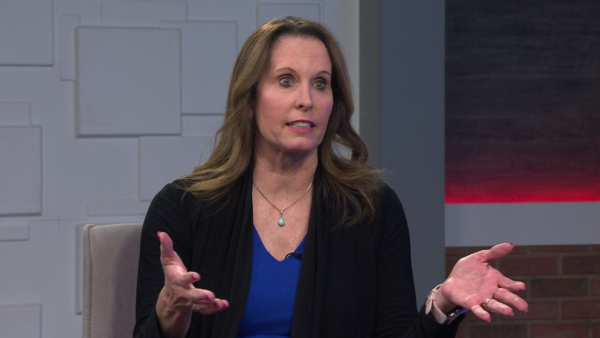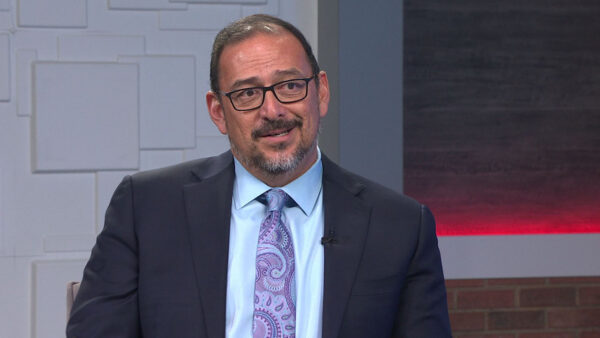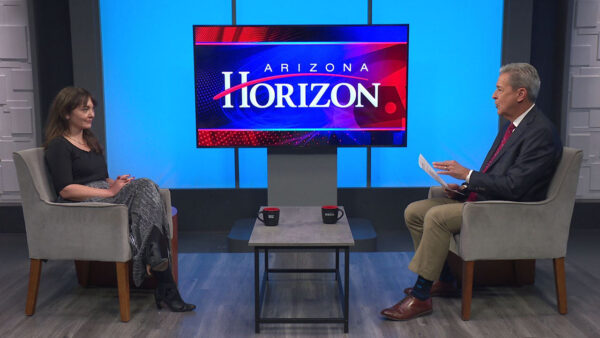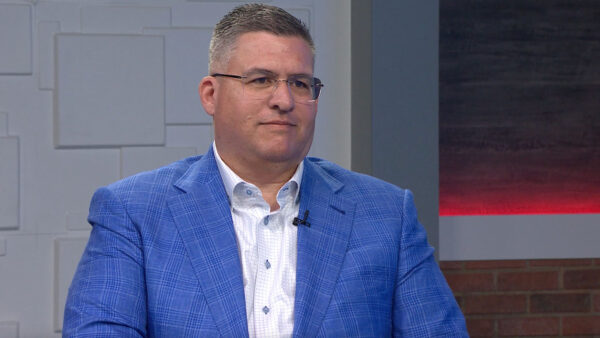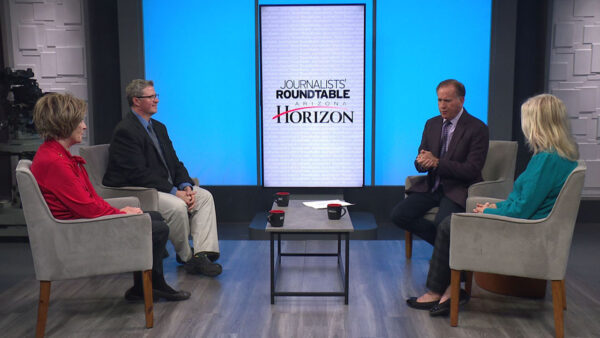Arizona State University researchers will discuss their findings regarding the causes of obesity. Dr. James Levine, co-director of the Mayo Clinic-ASU Obesity Solutions Initiative, will talk about the impact of sitting on weight gain. Alexandra Brewis Slade, director of operations for the ASU-Mayo Obesity Solutions Initiative, will talk about her research that compares obesity in different countries.
Ted Simons: Arizona State University researchers have been conducting new studies on obesity. Dr. James Levine, co-director of the Mayo Clinic/ASU Obesity Solutions Initiative is here to tell us more, as is Alexandra Brewis Slade, director of operations for the Obesity Solutions Initiative. Good to see you both here. Thank you for joining us.
Dr. James Levine: Absolute pleasure.
Alexandra Brewis Slade: Thank you.
Ted Simons: How serious is the obesity problem in America?
Dr. James Levine: Well, the way I look at it is, you know, we all know the statistics, that more than half of individuals living in America have a weight problem, a third have obesity. I think what concerns Alex and I more is this is like living in the valley and you see the storm coming in. We ain't seen nothing yet. Alex.
Ted Simons: So, it is escalating. It seems like it is escalating. Is it getting worse?
Alexandra Brewis Slade: It is. And it is a global problem, not just in Arizona, not just in the U.S. What we see in a lot of middle income developing countries now, a rate of acceleration of the problem and it is really speeding up. And as we get this new generation of kids with obesity, that is a completely new phenomenon and we don't know how that is going to play out when they hit adulthood.
Ted Simons: I want to get to your observations in other countries, societies and cultures in a second. Back to us here and this storm coming in, why didn't we see this storm? What's going on? I mean, something is going on out there.
Dr. James Levine: It is like anything in your family, you know. Like you're spending your credit card and you know you're overspending, but there are so many things you have to have in the house, you have to pay your bills and you know the impending doom is coming. In the scientific and policy community we have known that the childhood obesity epidemic is coming. We have seen it in the schools. We have seen it in our own kids. You just need to stand at a bus stop or travel on the light rail and you know what is happening.
Ted Simons: Okay. Are we not exercising enough? Are we not eating right? Has that changed considerably within the last decades to cause this?
Dr. James Levine: The answer is yes, not only are we not eating right and not only are we inactive all of the time, but we also have built this culture around us that makes being healthy very, very difficult. Yeah, we all want to make the right choices, but it is very, very difficult to step out, to eat healthy, to be able to afford to eat healthy and live right.
Ted Simons: Is it more difficult to do that or just to doggone easy to do the other?
Alexandra Brewis Slade: I think the interesting observation about why it has taken us so long to sort of caught on to this is that if you compare it to something like climate change where people are motivated to do things before they actually see the physical effects, obesity is really such a complex problem that people have, I think, there is almost this sort of comfort in deniability, because we can't even fix it for ourselves. It is incredibly difficult to lose weight. It doesn't matter how motivated you are. It doesn't matter how many self-help books you've got or even how much money you've got. It is very, very hard to do. If we can't do it individually, then doing it collectively is even a bigger ask.
Ted Simons: Stress, genetics, lack of sleep, exercising, eating, are we seeing it just affect this person does A, B, C, they're not obese. This person does A, B, C and they have a problem. Are we seeing that out there?
Dr. James Levine: It is interesting, the resiliency factor that somehow, some individuals, the miracle to me is that anyone is lean. In fact, we have done intensive studies to try to understand what is it about two people who sit next to each other at work, but one person is lean and one person is battling obesity? What is the difference between the two individuals? But it is -- the stress may be the same, but we all know this. We all deal with stress so differently. You know, some of us need more sleep than others and some of us have, you know, two, three jobs and -- and so many of my patients are rushing around all of the time. Not only are they stressed out, it is almost impossible to gather the time to have either a healthy walk or a healthy meal.
Ted Simons: I want to get to healthy walks in a second. I know you are big on that, standing up and walking.
Dr. James Levine: Big time.
Ted Simons: You have been all over the world. You studied cultures all over the world. Are they having the same kind of problems?
Alexandra Brewis Slade: Well, it's interesting. A lot of the middle income countries like China and India are predicted to have massive health care collapses in the next decade or so. One of the things we are seeing in our research as social scientists, it is not just the physical issues and cost issues around obesity, it's also the social issues. We are seeing a globalization of what we call fat stigma, the idea that we judge people because of their weight. This is problematic. Because we know that the stigma also makes it more difficult. If you blame people for their weight, it actually makes it more difficult for them to lose weight and keep it off.
Ted Simons: Can you blame people -- I hear that all of the time -- can you blame someone for not being able to lose weight?
Dr. James Levine: You have to stop the blame game. You just need to spend time with individuals who are battling with obesity to understand that -- who would want to have obesity in modern society? You are stigmatized, health problems, you can't get around the way you want to. Who would choose that for themselves? No one would. And again, when you actually talk to people who are battling this and you listen to their concerns, and the things that are going on every single day in people's lives, one starts to understand that people want to make the right choices, were they either available or were they had the time and facility to actually enjoy them.
Ted Simons: Are you seeing that around the world? It would seem to me that in some cultures, maybe not too long ago, obesity may not have been considered such a bad thing.
Alexandra Brewis Slade: That is the case. We went out about three years ago, did a survey across a whole range of societies where that was the case historically and we found that that is not the case anymore. So, that's very concerning. But one of the things we have found and some of the rates in other countries are higher than the U.S., but it seems to be more of a politically correct factor. It is not that Americans are not thinking as bad of things over overweight people, they're not so quick to say them because they know that they're not meant to. There is this really interesting global problem, but I think one of the things about -- Jim very much tackles these issues from the perspective of someone that works with patients. But as a social scientist, I always come back to the observation that in the U.S. now, poverty is the major predictor of obesity. And if that is the case, then you really have to look at the structural effect as well. That takes us out of thinking about it is something to do with individual behavior. If it is very difficult to be slim when you have a lack of resources, then that's something that I think we have to look at socially, structurally, how we build our cities, how we organize ourselves, how we design our workplaces.
Ted Simons: With that idea, let's get back to you and this idea. You kind of invented this desk where you stand up -- you are a big stand-up guy and walking guy. You don't like sitting down.
Dr. James Levine: I'm feeling like constrained sitting here.
Ted Simons: Talk to us about this.
Dr. James Levine: But, you know, one of the differentiators between individuals who are lean and those who are battling obesity, those individuals who are lean are up and moving around two and a quarter hours a day more than people with obesity. Who has two and a quarter hours a day to go to a gym and so on and so forth. We have been very interested in finding ways to slot, to inject activity time into the workplace and into schools. And I would like to emphasize something Alex just said. There have been fantastic data right across the country, 3,300 counties in the United States that demonstrate that not only are areas that have high levels of poverty associated with, you know, food deserts and low quality food but these are the areas, too, where the people are most sedentary.
Ted Simons: You said up and moving around. Then you said don't have time to go to the gym. You don't mean sweating it out and doing the Richard Simmons business out here. We won't go there.
Dr. James Levine: Let's not.
Ted Simons: But the idea of literally get up and go to one room to another, walk to the mailbox instead of -- what?
Dr. James Levine: That's exactly right. Walk and talk meetings. If you are at work, the opportunity to get up and move throughout the day whether it is a walk and talk meeting, instead of emailing someone two doors down. Just get up and walk there. When the phone goes, just get up and pace around. The data is clear if you can break up your sitting time, it is a very powerful way of staving off bad metabolism for diabetes and hypertension and so on.
Ted Simons: Do you think that is what is happening in other cultures, that people are perhaps more sedentary? The cultures that went out and did things, everything is modernized now and we are sitting more.
Alexandra Brewis Slade: That is part of the capitalist dream. As you move into a cash economy, you are less likely to be farming, you are less likely to be fishing, less likely to be walking. And as economies modernize, one of the things that happens is that the type of jobs that people have become much more sedentary. As a massive global treatment that has been going on for the last several decades.
Dr. James Levine: We actually studied people living in agricultural communities in Jamaica before they moved into Kingston in the city. What we discovered, when they live the capitalist dream, people half the amount of activity that they do. We are not talking about anyone running. We are talking about halving the activity that is the natural way the human is meant to be.
Ted Simons: And there might be increased stress. They're not halving their mental activity, they're halving their physical activity.
Dr. James Levine: Absolutely. The stress builds up and one eats more to feel more comfortable with oneself and the cycle builds.
Ted Simons: I did want to mention though, you did invent the desk treadmill.
Dr. James Levine: Indeed, I did. And that is being sort of -- there are tens of thousands of these out there. And it, you know, I -- I was thought to be crazy the day we came up with it but it has proven to be a good idea.
Ted Simons: Interesting conversation. Good information. Good to have you both here.
Jim Levine:Co-director of the Mayo Clinic/Arizona State University Obesity Solutions Initiative; Alexandra Brewis Slade:Director of Operations, Mayo Clinic/Arizona State University Obesity Solutions Initiative

